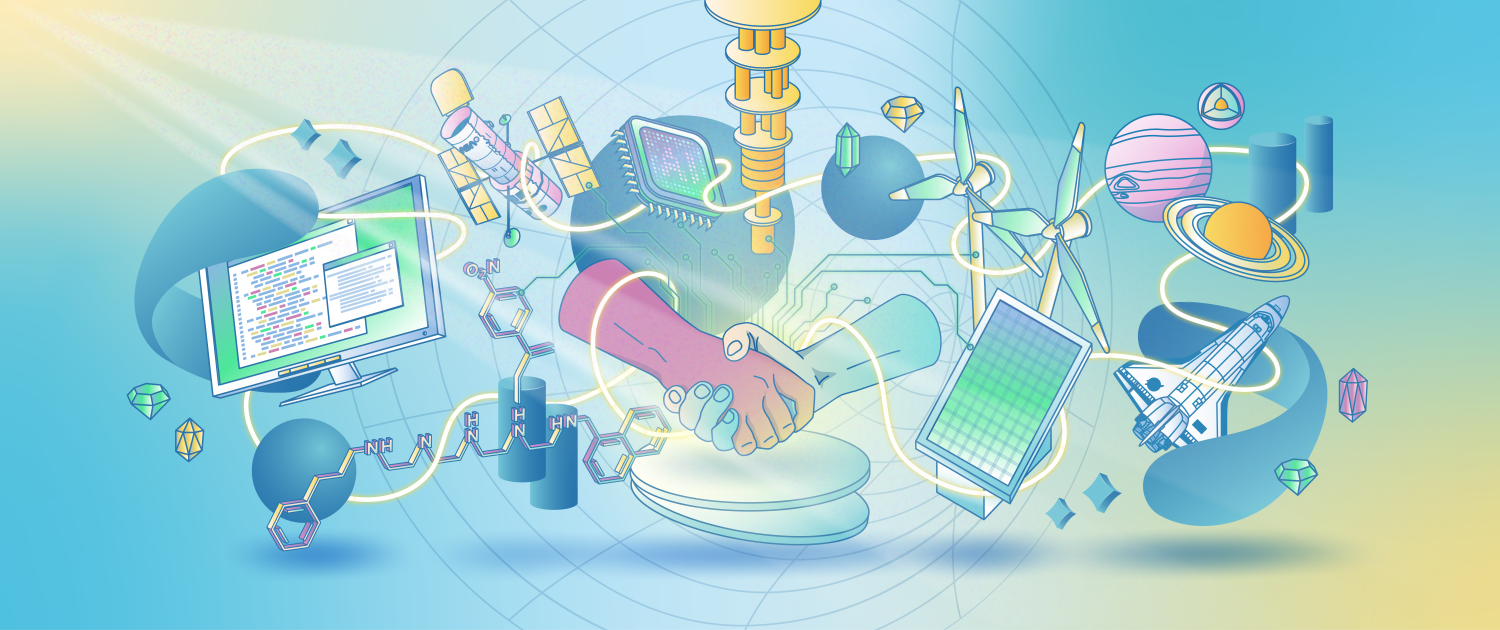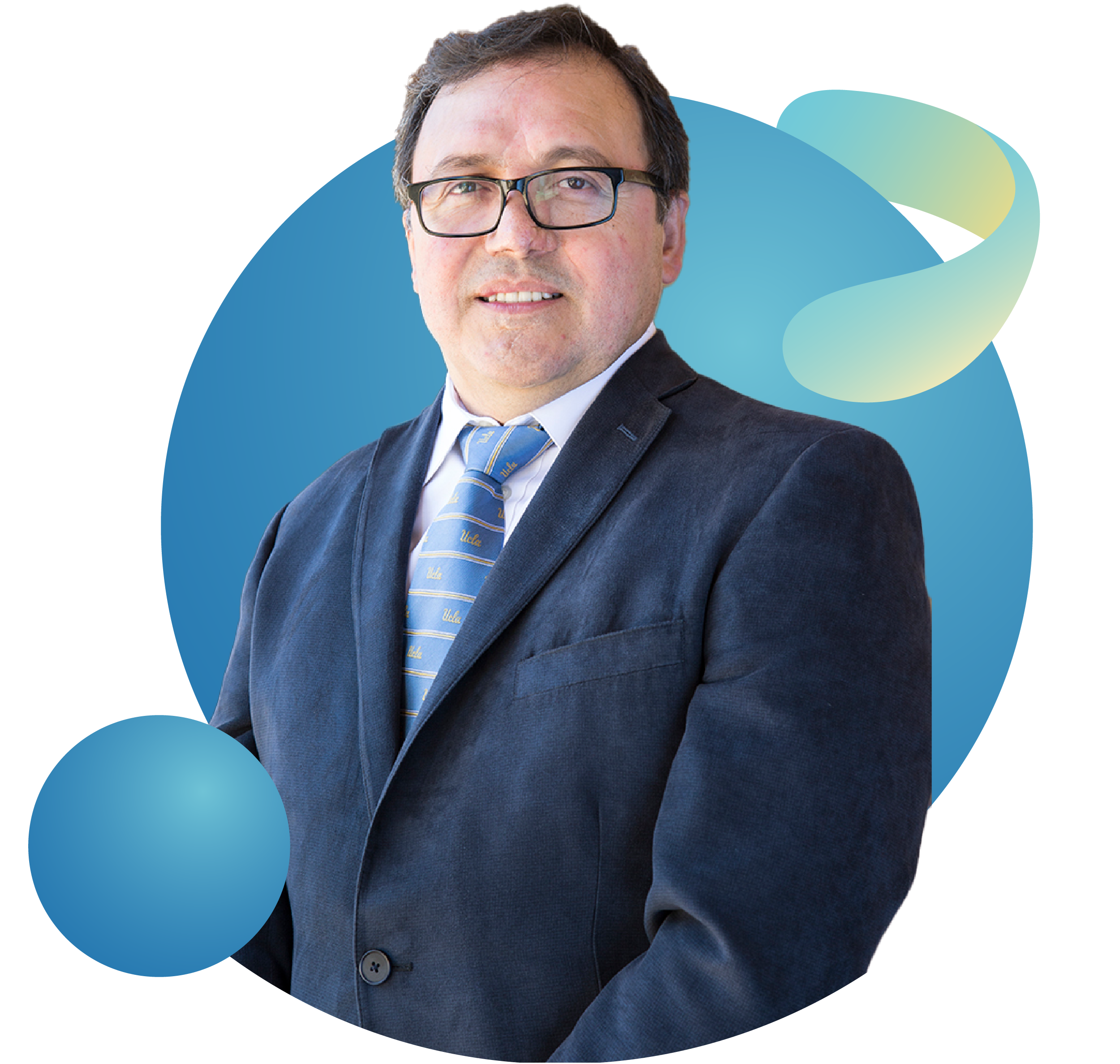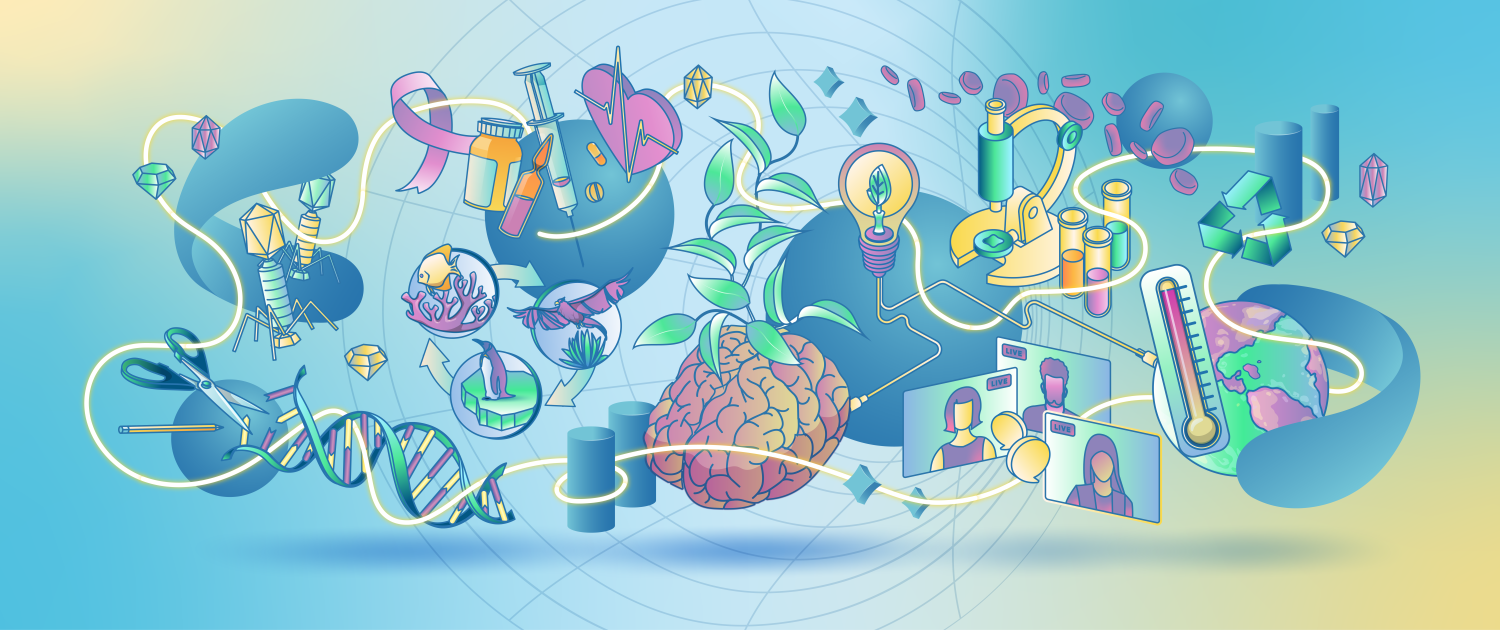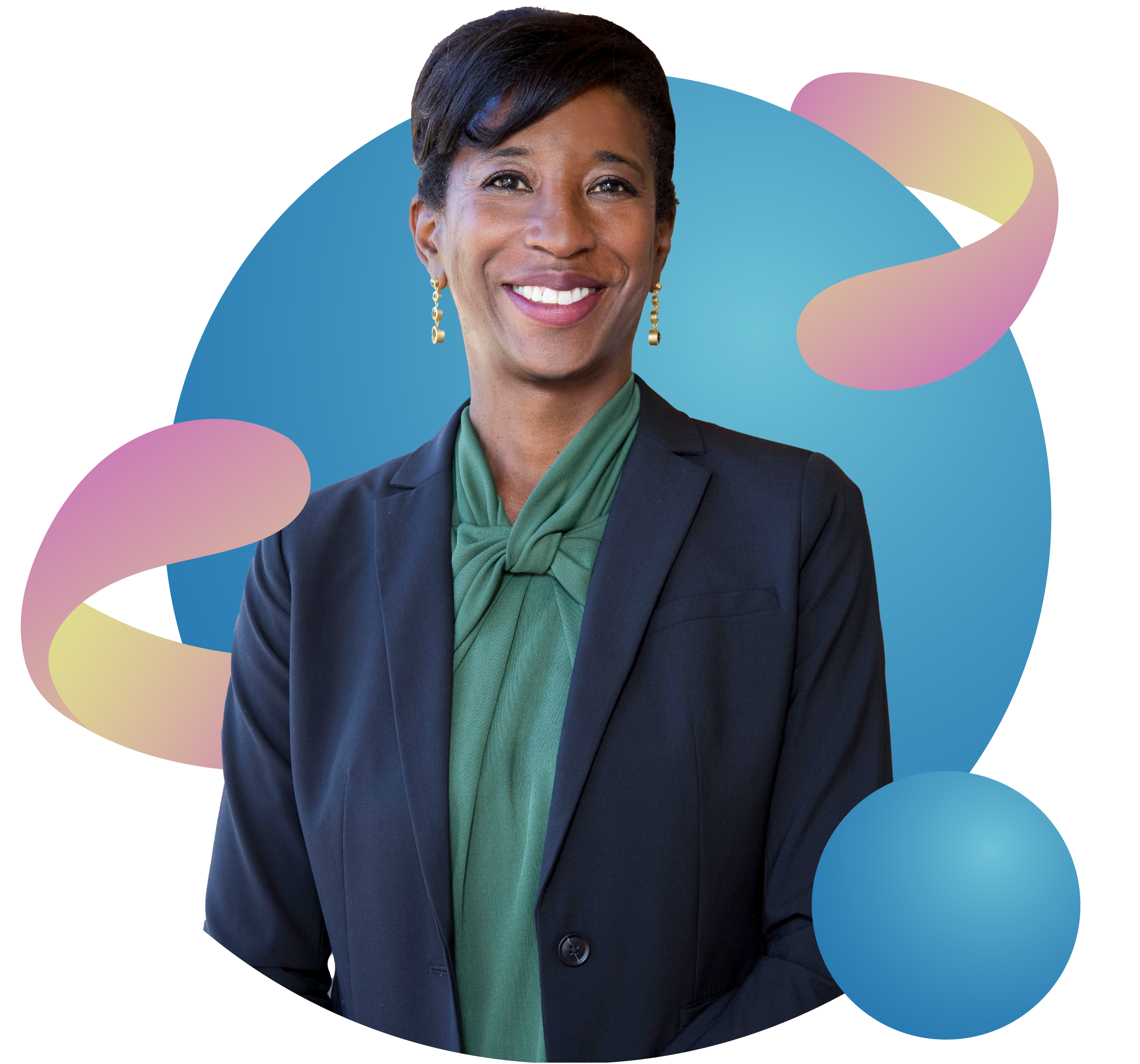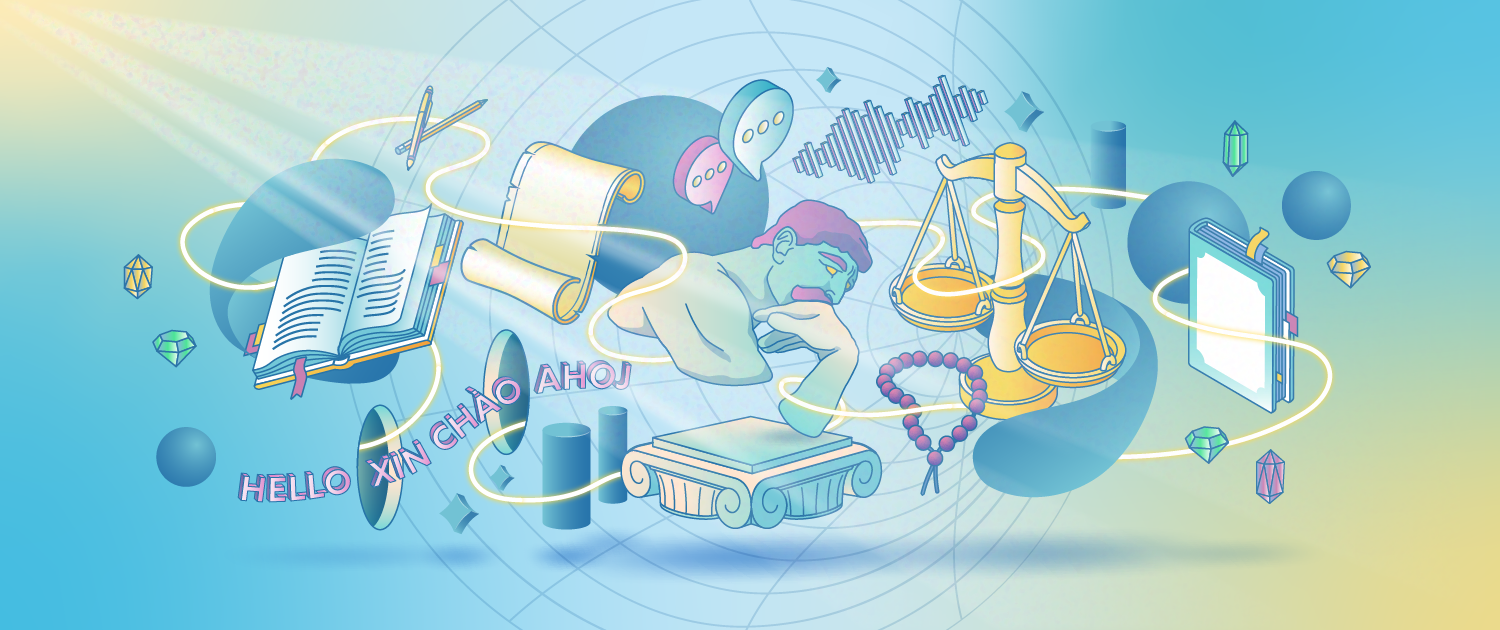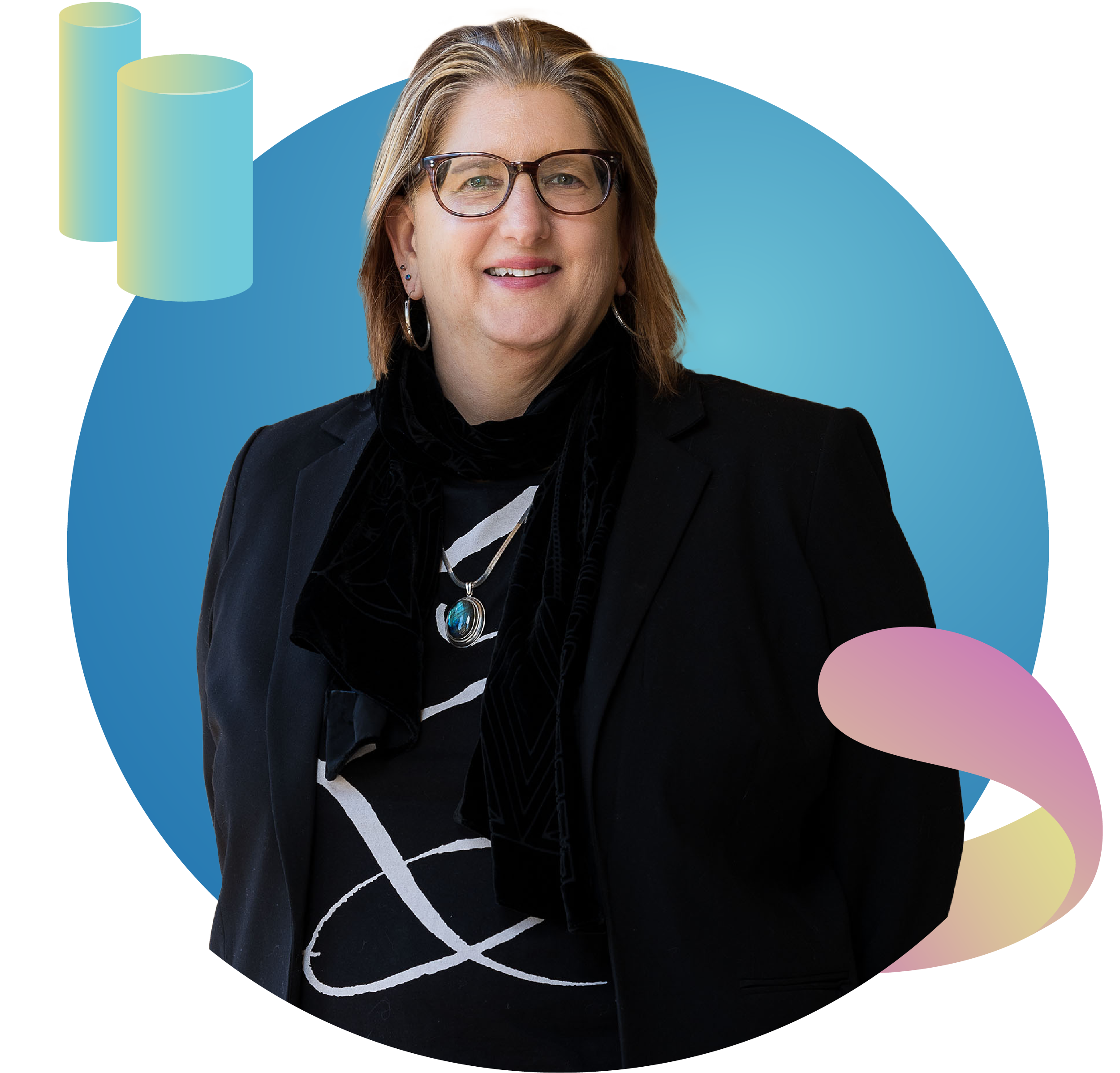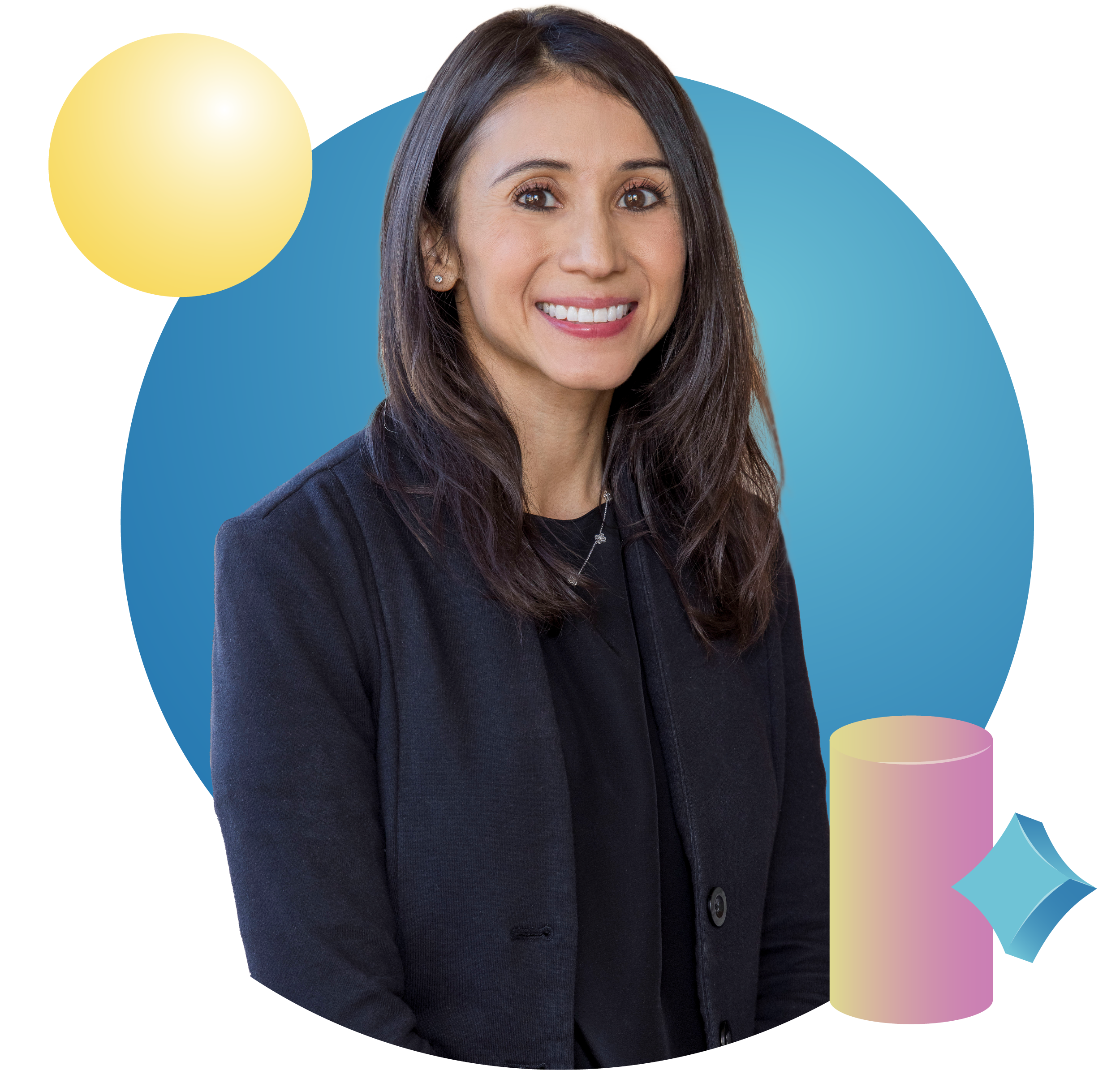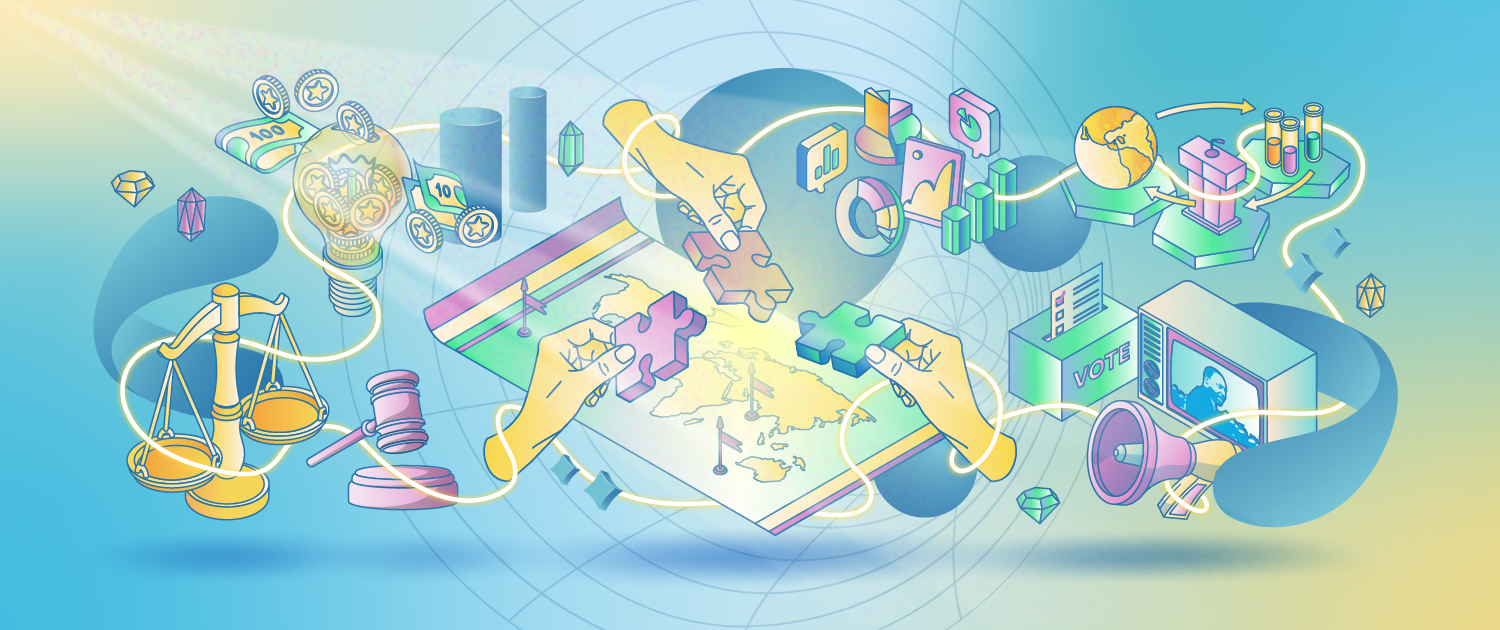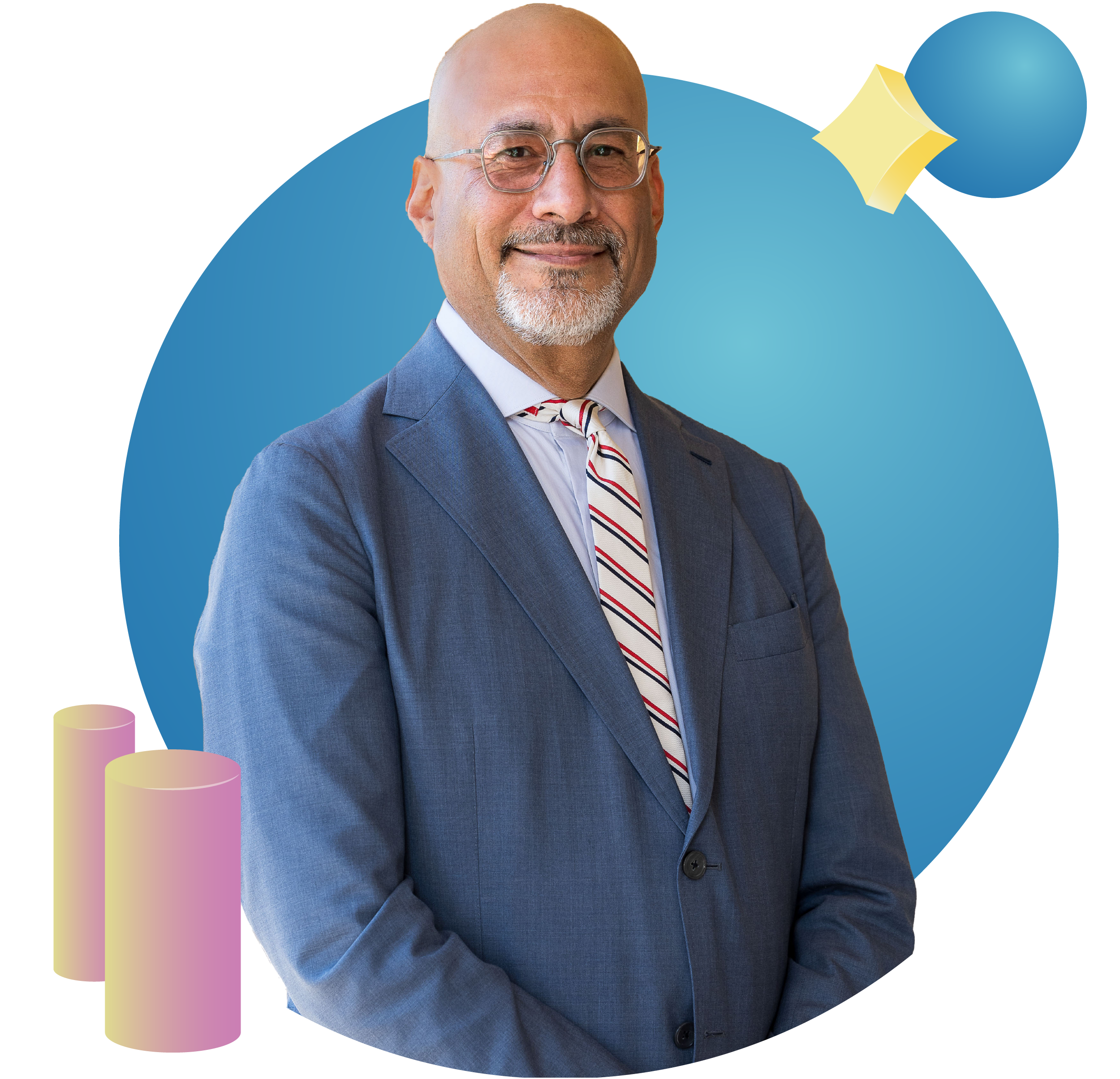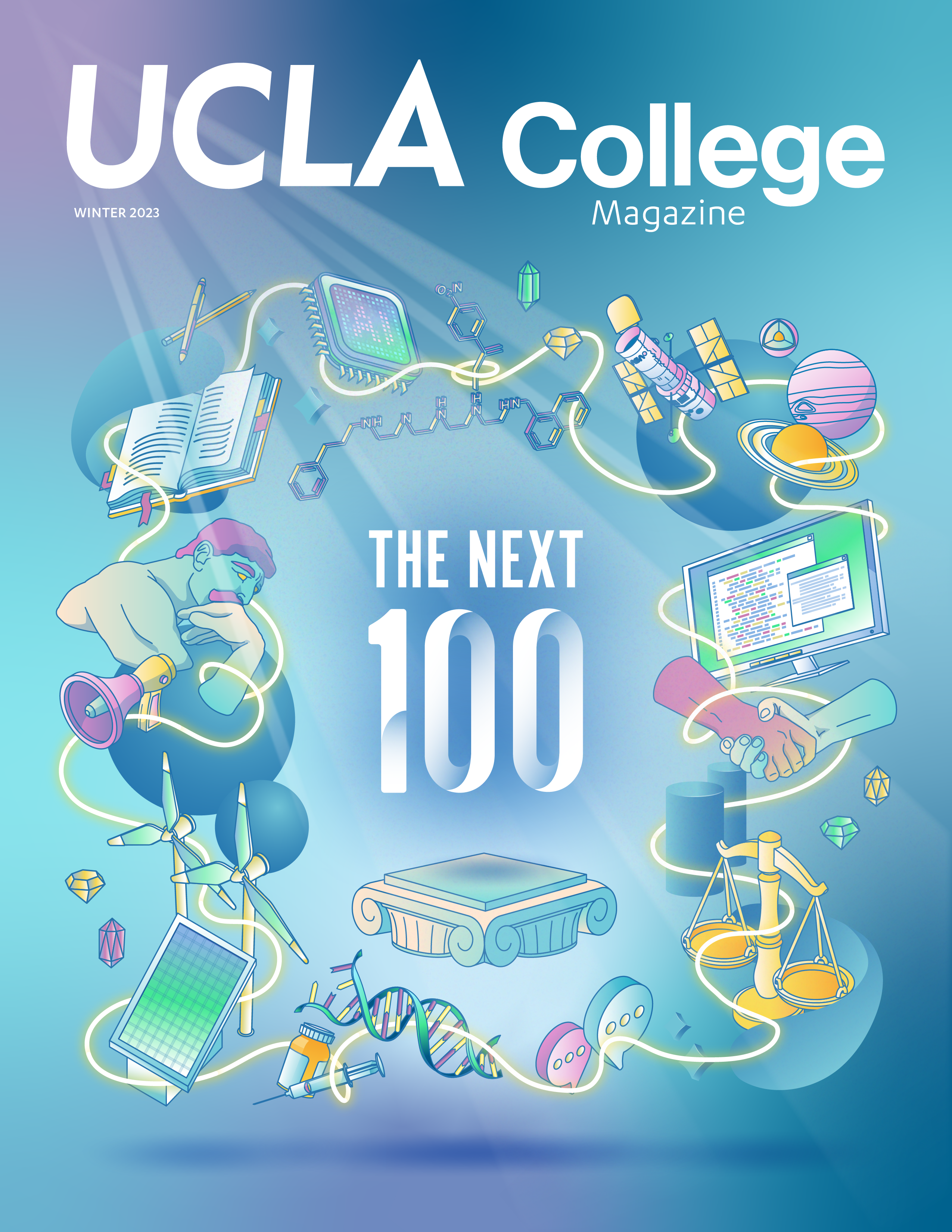Bruin Visions for the Future
“I foresee robots and AI will make the impossible possible on the atomic scale, and education will be totally oriented to creative design in a holographic laboratory.”
—James K. Gimzewski, distinguished professor of chemistry
“I imagine that the next 100 years will bring additional university support, a Center for Scholarships and Scholar Enrichment endowment and donors who value the fact that students struggle with college debt. I would also like to see more creative ways to forgive loan debt so that students — undergraduate and graduate alike — are not burdened upon graduation.”
—Angela Deaver Campbell, director of the CSSE
“I think mathematics in the next 100 years will be very human-focused. There is already a huge growing need to understand AI, what it means for humans, what it means about intelligence and what it means in terms of fairness and social justice. I see mathematics playing a key role in answering these human-centered questions.”
—Deanna Needell, professor of mathematics, Dunn Family Endowed Chair in Data Theory and executive director, Institute for Digital Research and Education
“Most analytical methods in marine biogeochemistry will be miniaturized (‘lab on a chip’), and we will be able to do in-situ sequencing of marine eDNA. As a result, we will be able to generate more complex datasets to capture small-scale and short-term changes in the ocean.”
—Tina Treude, professor of marine geomicrobiology
“With the rise of AI and greater sensitivity to human creatureliness, we will deepen our exploration, and hopefully understanding, of religion as a profoundly human phenomenon. New questions will emerge as religious expression, beliefs and practices swiftly move beyond traditional as well as institutional confines. And, indeed, the perennial question, ‘What is religion?’ will continue to animate the field.”
—Carol Bakhos, professor of late antique Judaism and Jewish studies, chair of the Study of Religion program and director of the Center for the Study of Religion at UCLA
“I’m hoping that in the future, every student will get a chance to have a Cluster experience. The integrative way of learning about multiple fields is the best way to satisfy general education requirements while giving students a community to help with the transition to UCLA, so it would be wonderful if we had the capacity for every incoming student, first-year or transfer, to learn in this unique program.”
—Anthony Friscia, director of the UCLA Cluster Program and associate teaching professor of integrative biology and physiology
“I would hope that after 50-plus years of existence, the Academic Advancement Program would be completely endowed by alums and friends of the program. It has transformed the lives of so many students and continues to be the nation’s premier student diversity academic support program.”
—Charles Alexander, associate vice provost for student diversity and director of the Academic Advancement Program
“We envision a future in which reproductive policies and care are based on rigorous science, in which access to reproductive health care is more equitable, and in which the care that people access leverages a deeper understanding of the biology of reproductive cells and systems for better treatments over the life span.”
—Amander Clark, professor of molecular cell and developmental biology as well as director of the Center for Reproductive Science, Health and Education; Hannah Landecker, professor, Institute of Society and Genetics and author of “Culturing Life: How Cells Became Technologies” and co-director of the Center for Reproductive Science, Health and Education
“I hope that in 100 years, the field of cell biology will include not only a detailed understanding of the molecules within a cell (organelles, proteins, RNAs, metabolites), but also a deeper appreciation of the underlying circuitry and regulatory logic that controls their behavior.”
—Hilary Coller, professor of molecular, cell and developmental biology
“I study intimate relationships, and over the past few decades, we have learned a lot about: a) how central the health of our intimate relationships is to individual well-being, and b) how strongly our relationships are affected by economic and stressful conditions outside the home. A century from now, I’d hope that these facts were such common knowledge that policy-makers request a relationships impact report for all new legislation, the same way current legislation requires economic and environmental impact reports. Family values will take on a new meaning when we realize that EVERYTHING WE DO as a society affects our closest and most private relationships.”
—Benjamin Karney, professor of psychology, co-author of “Intimate Relationships”
“Today, in 2023, we know beyond any doubt that true fulfillment of human potential is only possible when people enjoy close relationships, authentic intimacy and sustained social connection — and that people suffer profoundly when they are lonely, isolated, bullied, neglected and abused. In 2123, I hope that love, intimacy and bonding are recognized and exploited for the immeasurable benefits they provide to all people at every stage of life. By organizing our governments, our economies, our health care systems and our communities around this basic principle, more children will be nurtured, more individuals will thrive and loving families of all kinds will flourish.”
—Thomas Bradbury, distinguished professor of psychology, founder of the Marriage and Family Development Laboratory at UCLA, and co-author of “Intimate Relationships”
“I am dreaming of the world where all the knowledge of biology is not merely connected in words and ChatGPT, but through a unified bio-mathematical model that describes how everything — whether molecules, cells or organisms — quantitatively relates to everything else. In the model, you can zoom in to see the details of how the atoms of pharmacologic inhibitors interact with macromolecules, and you can zoom out to see how ecosystems are affected by climate change.
“Each branch of life sciences would use different aspects of this unified model to explore and refine our understanding, and pharma companies could simulate people to do virtual clinical trials of different groups of people to determine who will benefit from a new therapy.”
—Alexander Hoffmann, professor of microbiology, immunology and molecular genetics as well as director of the Institute for Quantitative and Computational Biosciences
“As a friend from a Historically Black College said to me recently about their campus, ‘Every member of our community, from a gardener to the president, feels like they belong and they can succeed.’ This is what I would like to see: that all STEM students, staff and faculty are being equally welcomed and nurtured into an environment that values their lived experiences and their unique ways of knowing.
“Our STEM classrooms can become places where all students and instructors are partners in the learning process, collaborating and co-creating knowledge, deeply listening and learning from each other with empathy and kindness, and recognizing each other’s humanity. We have examples of STEM learning spaces where this is happening, and I am confident that by continuing to critically question our systems and structures, we can achieve true justice in STEM education.”
—Rachel Kennison, associate teaching professor of ecology and evolutionary biology as well as executive director of UCLA’s Center for Education, Innovation and Learning in the Sciences
“Hopefully, in less than 100 years we will be treating genetic diseases more seamlessly. For a patient with a specific disease-causing mutation, we might directly inject gene repair reagents into the blood stream that home to their specific target tissue — whether that’s in blood stem cells, the brain, muscle, heart, lungs, etc. Perhaps this could be done shortly after birth, or even in utero, minimizing any disease-related complications from ever occurring.”
—Donald B. Kohn, distinguished professor of microbiology, immunology and molecular genetics as well as of pediatric hematology and oncology
“In 100 years, I would love to see psychology and neuroscience have a meaningful account of consciousness. We still don’t even know how to ask the right questions, let alone even begin to answer them. In a century, after the ‘Einstein of psychology’ hopefully emerges, they will look back on today’s ‘science of the mind’ as prehistoric.”
—Matthew D. Lieberman, professor of psychology, director of the UCLA Social Cognitive Neuroscience Laboratory and author of “Social: Why Our Brains are Wired to Connect”
“One hundred years from now, I hope we understand how the joint action of objectively measurable proteins, ionic flows and molecules inside the human brain gives rise to a completely subjective viewpoint, the feeling of an ‘I’ that is ‘seeing, hearing, touching, tasting and smelling’ the world. It would have to be an explanation through a neat mechanistic chain of how and why the way matter is arranged in the human brain results in a subjective feeling of ‘being,’ which each one of us possesses, but the way matter is arranged in, say, a rock does not.”
—Martin Monti, professor of psychology and of neurosurgery in the Brain Injury Research Center


